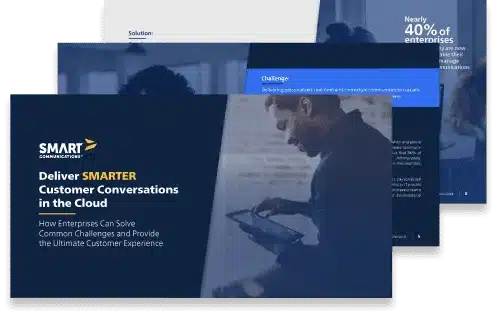Simplifying Legacy CCM to Cloud Vendor Migration

By Scott Draeger, SVP of Product Marketing and Vertical Solutions at Smart Communications
When confronted with technical debt, it’s easy to look the other way. Many organisations have customer communications applications that have been running for ten, or even twenty, years. As technology improves, you may find that your team feels like they are working for the technology, rather than having the technology work for your team. As budget cycles pass, these applications get older. They consume more resources, create more risk, and block innovations that your customers deserve. But, with cloud-based Customer Communications Management (CCM), modernising your CCM technology doesn’t have to be taxing.
Cloud-native applications like SmartCOMM™ and SmartIQ™ are proven to create effective communications at scale, while meeting security requirements and flexibly scaling to handle peak loads at the most demanding times of your team’s year. Leading Australian banks can produce over 60 million pages per hour with SmartCOMM. High-profile and high-security use cases, like passport and visa communications, have shifted away from home-grown systems to transformed experiences using SmartIQ. Smart Communications’ recent cybersecurity assessment boasts high scores in every category. Leading government agencies in Australia, and elsewhere, are reducing costs and increasing flexibility by moving to cloud-based solutions.
Transformation is Faster Than You Think
Many agencies believe they are saddled with technical debt, because migration is expensive. Your current vendor may offer an upgrade to newer technology, but that upgrade may not have migration tools, skilled migration practices, or experience with your applications. Often, upgrades require your agency to pay to maintain two complete systems while also paying time and materials for expensive vendor-supplied services staff. With that type of expense, it’s no wonder upgrades are avoided for a decade or more.
Smart Communications uses a combination of software, AI technology, and experts to quickly turn your existing output into the first communications of your transformed customer experience. Smart Communications’ approach to omnichannel communications emphasises content to make it easier to communicate clearly across the full range of your customers, using a wide array of channels, accommodating diverse accessibility needs, and conforming to data privacy legislation. This approach automates the migration of text content, images, data and other key assets. This accelerates the transformation of your customer communications.
After completing the swift migration, we transition the project to the customer, allowing them to focus on internal enhancements and ongoing sustainment. Customers establish in-house centres of excellence, empowering business users to take ownership of their processes. This shift puts you in position to improve employee experience by eliminating hard coded changes to multiple systems, removing redundant channel-based design work, and reducing the risk of errors due to application complexity.
Ready to Integrate?
Legacy technology is not always compatible with current technology. As a result, agencies spend a lot of effort developing around software limitations. Leading solutions are cloud-native, allowing for easy integration with systems via APIs that accelerate your deployments, increase flexibility, and reduce risk. As you consider portfolios, some CCM vendors offer a wide variety of technology, but it is often not integrated, not available in the cloud, or not compatible with other technologies you need. As the leader in cloud-native CCM, Smart Communications can provision your system in under two hours, while others require many meetings and delays before your tenancies can be created.
Regain Control of Critical Agency Applications
Over time, applications on legacy platforms become difficult to manage. Incompatible software and hardware upgrade cycles collide with integration requirements to make even simple changes difficult to execute. None of this matches your budget and planning calendars. Over time, this increases reliance on external contractors with increasingly expensive sets of highly specialized domains of expertise. When simple changes take considerably more time from increasingly more expensive contractors, your organization loses time, budget, and control of how you communicate with your customers.
How Do You Work with Agencies?
Smart Communications understands your organisation as well as we understand your application. Because we understand your business, Smart Communications can create transformation programs that closely match your investment to your savings. This is done by creating multi-year transactions that consider your lower initial volumes, to phase in your investment while you phase in your new technology. Additionally, professional services expenses can be spread over the term of the agreement as well, allowing you to propose a solution that doesn’t triple your year one expenses.
Understanding your staff, budget cycles, and organisational needs allows Smart Communications to propose solutions that can pass your planning process, deploy rapidly, and deliver early initial results.



